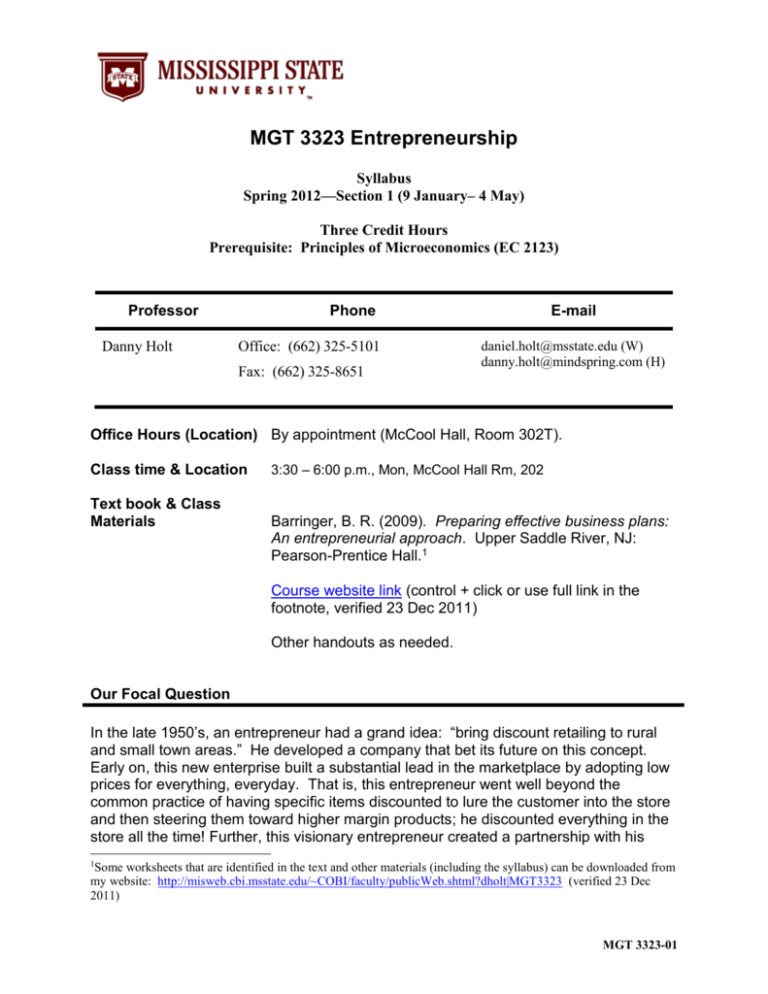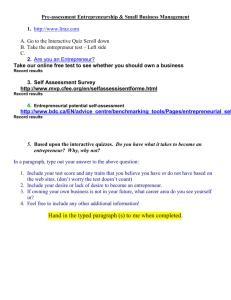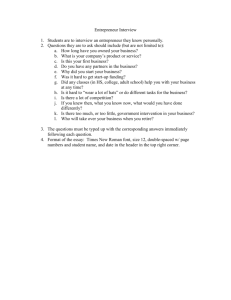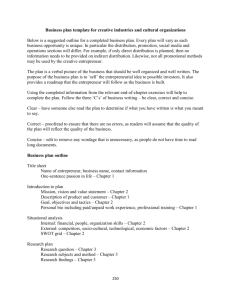
MGT 3323 Entrepreneurship
Syllabus
Spring 2012—Section 1 (9 January– 4 May)
Three Credit Hours
Prerequisite: Principles of Microeconomics (EC 2123)
Professor
Danny Holt
Phone
Office: (662) 325-5101
Fax: (662) 325-8651
E-mail
daniel.holt@msstate.edu (W)
danny.holt@mindspring.com (H)
Office Hours (Location) By appointment (McCool Hall, Room 302T).
Class time & Location
Text book & Class
Materials
3:30 – 6:00 p.m., Mon, McCool Hall Rm, 202
Barringer, B. R. (2009). Preparing effective business plans:
An entrepreneurial approach. Upper Saddle River, NJ:
Pearson-Prentice Hall.1
Course website link (control + click or use full link in the
footnote, verified 23 Dec 2011)
Other handouts as needed.
Our Focal Question
In the late 1950’s, an entrepreneur had a grand idea: “bring discount retailing to rural
and small town areas.” He developed a company that bet its future on this concept.
Early on, this new enterprise built a substantial lead in the marketplace by adopting low
prices for everything, everyday. That is, this entrepreneur went well beyond the
common practice of having specific items discounted to lure the customer into the store
and then steering them toward higher margin products; he discounted everything in the
store all the time! Further, this visionary entrepreneur created a partnership with his
1
Some worksheets that are identified in the text and other materials (including the syllabus) can be downloaded from
my website: http://misweb.cbi.msstate.edu/~COBI/faculty/publicWeb.shtml?dholt|MGT3323 (verified 23 Dec
2011)
MGT 3323-01
people, engineered sophisticated information systems, and instilled a performance
guided culture, with store managers reviewing weekly scorecards at 5 a.m. each
Monday morning. Not only did this entrepreneur’s company decimate Main Street
stores in the small towns it entered but it also learned how to beat its primary
competitor, the much larger Kmart, in head-to-head competition. Every dollar invested in
the firm created by this entrepreneur in 1970 and held through 1985 grew more than six
thousand percent!
So, what is the name of the entrepreneur and the firm he created?
If you answered Sam Walton and Wal-Mart, good guess—but these are wrong!
This entrepreneur, with the same idea that eventually has made Wal-Mart famous,
introduced its store four years before Sam Walton opened his first Wal-Mart in Rogers,
Arkansas. Yet, you may have never heard of this firm because today this firm is dead.
Bankrupt. Gone. Wal-Mart, in contrast, is alive and well, topping the Fortune 500 with
$379 Billion in revenues.
What happened? What distinguished this entrepreneur and the firm he created from the
now famous Sam Walton and Wal-Mart? These are some of the mysteries and puzzles
that we often struggle with in the world of management and business. First, it is difficult
to say that this entrepreneur was a failure. While many businesses fail simply because
the idea is poor (Barringer, 2009), it would be equally difficult to say that the idea
underlying the firm was poor. Still, after several years of financial success, this
entrepreneur’s firm went through two bankruptcies, failing to survive the second one.
New ventures often don’t even get this far. Studies have indicated that 20% of new
ventures fail within the first year and 66% fail within the first six years. While there is no
sure way to guarantee long-term, sustainable success of a new venture, we would like
to understand, WHAT IT REALLY TAKES TO DEVELOP A FIRM WITH HIGHPOTENTIAL?
Our Plan & Objectives
In this course, we will explore and celebrate the phenomenon of entrepreneurship.
Entrepreneurship is approached as a way of thinking and acting, as an attitude and a
behavior. Our emphasis will be on entrepreneurship as a manageable process that can
be applied in virtually any organizational setting. Given our focal question, however, we
will look at new ventures, the ways that they come into being, and factors associated
with their success. In the process, we build the needed skills to conceive and screen
new business ideas and evaluate all aspects of the feasibility of business ideas. Ideally,
this experience will give you insight into the challenges associated with initiating a
MGT 3323-01
venture and better prepare you to effectively manage the development and growth of a
new business or a new endeavor in virtually any organizational setting.
You may or may not ever become an entrepreneur by starting a new venture, but you
may have to decide someday about investing in a new endeavor for yourself or a larger
firm. This course will give you a framework that you can use to evaluate those
endeavors and make prudent decisions. This course will also help you understand
yourself, those around you, and the environment you find yourself in as you lead and
manage new endeavors. Specifically, we will address some of the following questions:
How can you prepare to be an entrepreneur?
To what extent do you have entrepreneurial interests and capabilities?
How can you analyze the feasibility of a business idea and develop a specific
business plan?
How do you get those around you engaged and charged through your written
and oral presentations?
Our Approach
To understand and learn the challenges associated with entrepreneurship, you will go
through the steps to assess the feasibility of a new venture. These include analyzing the
industry, identifying the market to be served, scrutinizing the financial feasibility of the
venture, presenting a marketing plan, and providing details on the management
structure. Thus, you will do a series of assignments that will help you develop, screen,
refine your thinking, and convey your understanding through the assignments. Each of
these assignments is explained in detail on the assignment description forms (see
MISWEB).
To prepare, you must be willing to read, actively research, and go out to speak with
business leaders through first-hand research. The readings in the book will guide you
and I will facilitate your learning by introducing and explaining concepts that you see in
these readings. We will openly and flexibly discuss the concepts, focusing on issues
that you find most beneficial never losing sight that we are trying to find out, whether a
high-potential firm is feasible.
You must review the course schedule, reading the assigned pages prior to class and
completing the assignments (and turning them in as specified). It’s never too early to
start working on assignments. At times you will find it difficult to get entrepreneurs to
return your calls—they are busy and their schedules are tight. Still, like a practicing
entrepreneur, you will be expected to find the most accurate information and details on
MGT 3323-01
your new venture—be persistent (although polite and respectful), creative, and
innovative.
Our Demonstration of Understanding
All the assignments can be done individually if you prefer. Certain assignments (as
noted) can be done in groups with no more than three members. To begin the creative
process and help you identify opportunities, you will, for instance, reflect on your own
life, your personal needs, activities in which you are involved, things you like to do,
relationships that you have, things that you observe in your everyday world, and make a
laundry list of specific things that “bug” you (i.e., Individual creativity exercise or Bug
report). From this list, you will identify and describe five specific business ideas (this
assignment will represent 5 % of your final grade).
The assignments and the weights associated with each are summarized below:
Assignment
General Scope*
Percent Weight
toward final
grade
--
5
On-line
assessment
5
8 page worksheet
with comments
10
Industry, Competitor, & Target Market Analysis (can be
done individually or in a group of no more than 3)
20 – 25 page paper
20
Financial Feasibility Analysis (can be done individually
or in a group of no more than 3)
5 page paper
10
Full Feasibility Study (can be done individually or in a
group of no larger than 3)***
50 – 60 page paper
30
Individual Final Exam (Cumulative exam done
individually)
Long answer essay
(expect 5+ pages)
20
Individual creativity exercise (Bug Report)
Individual entrepreneurial propensity measure
First screen & opportunity analysis (can be done
individually or in a group of no more than 3)**
100%
*The specific requirements for each assignment are included on the assignment sheets.
These can be downloaded from the course website on MISWEB.
** Your group must be finalized and a signed team contract must be submitted to me on the
MGT 3323-01
Assignment
General Scope*
Percent Weight
toward final
grade
date specified (if not, assignments will be completed individually).
*** This grade will be scaled by your self-assessment and your team members’ assessment
of your individual contribution (see the explanation).
You will not be placed in a team. If you would like to work in a team, your final
teams must be selected and finalized by the date identified on the course
schedule. After this date, changes in the team will not be allowed during the course of
the semester. If you choose to work in teams, pick your team members wisely. You
should notify me of your team’s composition by submitting Team Contract (see
MISWEB). This team contract must be signed by each team member and submitted at
the specified time (if this is not submitted as required, you will be expected to complete
all assignments individually).
Whether in a group or individually, you are expected to submit your work as outlined in
the schedule. No late assignments will be accepted. On the specified date,
assignments are due no later than 3:30 p.m.—if it is not turned in or completed (in
the case of the on-line exercise) at the time specified you will receive a zero.
I encourage you to plan accordingly because network, e-mail, printer, or computer
problems are not excuses for late work or work that is not in the proper format. If
you know of something that will prevent you from submitting an assignment on the due
date, you should make arrangements to submit the assignment early.
In addition, an electronic version of written assignments is required. The submission of
an electronic version does not eliminate the requirement for a printed version of the
assignment. You will, however, receive a 10% reduction in score on an assignment if
you fail to submit the electronic version at the time that has been specified. Like the
written version, network, e-mail, printer, or computer problems are not excuses for late
electronic submissions.
Extra credit opportunities may be made available on occasion. Two have been
specified. For one, you must submit five, truly unique and novel approaches where
existing ventures might change one element of the marketing mix. Thus, it could be a
totally new (radical) approach to pricing or a completely different method for distribution
(additional requirements are presented on the assignment sheet). For the other, you
must conduct an individual interview with an entrepreneur based on the structure
provided on the assignment sheet. The entrepreneur who is invited must have a
venture that is at least two years old with a minimum of five employees and
preferably ten employees.
MGT 3323-01
For any of these exercises that come up during the term, you can earn up to 5 points
extra credit that will be added to your overall course grade at the end of the term (note,
if the assignment is poorly done you may receive no credit). These assignments will be
due at a specified time and, like other assignments, late submissions will not be
accepted.
Our Assessment of Progress
Your final grade will be based on your individual performance. Each assignment will be
worth 100 points and final grades will be computed as a weighted sum of the points
earned on each assignment. For instance, earning a perfect 100 points on the Individual
Creativity Exercise (Bug Report) will represent 5 points toward your final grade.
Your written papers will be returned to you with comments. In addition, grades will be
posted as soon as they are available and can be accessed through MISWEB.
When working as a team, members of that team will typically be awarded the same
grades. Individual contributions will be assessed and taken into account on the Full
Feasibility Study. For the Full Feasibility Study, you will earn the percentage of the
team’s grade based on your contribution. For example, if your team earns a 92 on the
Feasibility Study and the average of the evaluation of your contribution (to include your
self-evaluation) is 88, you earn 88% of the 92, or 80.1.
The contribution grade will represent an average of an evaluation of your contribution
(to include your self-evaluation of your contribution, if you choose not to attend class on
the day these assessments are made, your team members will receive all of the points
that you could have given each of them had you been present to rate them while you
will receive a zero for your self-evaluation).
Individual Contribution to the feasibility study will be assessed by how well each
team member performs each of the following (see the team contract):
1. contributions to the team
2. time management
3. quality of work
4. attitude
5. preparedness
6. focus on the task
7. working with others
8. monitoring group effectiveness
Standards for final grades:
MGT 3323-01
A
100 – 90 %
B
89.9 – 80 %
C
79.9 – 70 %
D
69.9 – 60 %
F
Less than 60 %
Grades will be rounded to the nearest 0.1 %
Our Standards of Behavior
Upon accepting admission to Mississippi State University, you immediately assume a
commitment to uphold the Honor Code, to accept responsibility for learning, and to
follow the philosophy and rules of the Honor Code. Ignorance of the rules does not
exclude any member of the MSU community from the requirements or the processes of
the Honor Code. Moreover, academic dishonesty will result in disciplinary sanctions
consistent with the rules and regulations of Mississippi State University.
Given this, we will adhere to our University’s approved Honor Code which reads:
“As a Mississippi State University student I will conduct myself with honor and integrity
at all times. I will not lie, cheat, or steal, nor will I accept the actions of those who do.”2
As a professional courtesy (and in accordance with University policy), you or I will not
use our cell phones or any other electronic devices in class. Thus, these devices should
be turned off and put away before class begins. If you choose to use your cell phone
in class (to include texting or having the phone ring during class), you will be
asked to leave for the day.
Our Accommodations for Those with Disabilities
I will make every reasonable attempt to remove any physical barrier that may hamper
the ability of any individual to learn in our class. Feel welcome to discuss any limitation
with me. Please see Mississippi State University policy (AOP 12.35) for further
information regarding accommodation requirements for students with disabilities.
2
You can get additional information regarding the Honor Code at the following site:
http://students.msstate.edu/honorcode/ (tested 15 Dec 2011)
MGT 3323-01
Course Schedule
Spring 2012
Date
Discussion Topics
Assigned Readings & Class Assignment
Due Date
9 Jan
Introduction to the course & each other
Syllabus
Discussion of the syllabus
Chapter 1 (1 – 17)
Understanding entrepreneurship
Chapter 2 (pp. 21 – 34)
Basics of a feasibility analysis
Ensure you are registered for MISWEB (see
attached instruction sheet)
Download the Individual Creativity Exercise
(Bug Report) from MISWEB & complete the
assignment for 23 Jan
Individual entrepreneurial propensity
measure will be distributed via e-mail no
later than 17 Jan (the last day to add a
class).
16 Jan
No Class—Martin Luther King
Holiday
--
23 Jan
Developing business ideas:
Submit Individual creativity exercise
(Bug report; submit electronic copies no
later than 9 a.m., 24 Jan)
Creativity & idea generation
Complete the on-line Individual
entrepreneurial propensity measure NLT
3:30 p.m.
Download the Team Contract from
MISWEB, sign it for 30 Jan (if this is not
returned by the date required assignments
are completed individually)
Download the First Screen & Opportunity
Analysis sheet from MISWEB & complete
the assignment for 13 Feb (read pp. 35 – 51
as this will also describe the assignment)
MGT 3323-01
Date
30 Jan
Discussion Topics
Guest Speaker: Chuck, CJ’s Pizza
Guest Speaker: TBD
First Screen, Data Sources & Feasibility
Study
Assigned Readings & Class Assignment
Due Date
Submit Team Contract (if you choose to
work with others)
Download the Industry, Competitor & Target
Market analysis sheet from MISWEB &
complete the assignment for 5 Mar
Chapter 2 (pp. 35 – 51)
Chapter 3 (pp. 53 – 79)
6 Feb
Guest Speaker: Kelly Atwood, MSU
Career Center
MEET IN ROOM 218 (Computer Room)!!!
Guest Speaker: TBD
13 Feb
Industry & Competitor Analysis
Submit First Screen & Opportunity
Analysis (can be done in groups of three
if a team contract was submitted; submit
electronic copies no later than 9 a.m., 14
Feb)
Chapter 5 (pp. 101 – 122)
Chapter 6 (pp. 134 – 138)
20 Feb
Market Analysis
Chapter 6 (pp. 123 – 144)
Marketing Plan
Submit Marketing Innovations (not
required, extra credit opportunity)
(Last day to
drop)
27 Feb
Chapter 7 (pp. 145 – 164)
5 Mar
Operations Planning & Product
Development
Guest Speaker: TBD
Submit Industry, Competitor, & Target
Market Analysis (submit electronic
copies no later than 9 a.m., 6 Mar)
Download the Full Feasibility Study sheet
from MISWEB & complete the assignment
for 9 Apr
Chapter 9 (pp. 185 – 207)
12 Mar
No Class—Spring Break
ENJOY FAMILY & FRIENDS!!!
MGT 3323-01
Date
19 Mar
Discussion Topics
Financial feasibility
Assigned Readings & Class Assignment
Due Date
Download the Financial Feasibility Analysis
sheet from MISWEB & complete the
assignment for 26 Mar
Chapter 10 (pp. 209 – 234)
26 Mar
Management Team & Structure
Evaluation of Partners
Submit Financial Feasibility Analysis
(submit electronic copies no later than 9
a.m., 27 Mar)
Chapter 8 (pp. 165 – 183)
2 Apr
Workshop on Feasibility Study
--
9 Apr
Franchising
Submit Full Feasibility Study (submit
electronic copies no later than 9 a.m., 10
Apr)
Funding sources
Intellectual Property
Evaluation of Partners
16 Apr
Self diagnosis as a future Entrepreneur
Guest Speaker: TBD
23 Apr
Course summary & Wrap Up
Course critiques
Submit Entrepreneur Interview
assignment (not required, extra credit
opportunity)
Submit a revision to the Full Feasibility
Study (not required, an opportunity to
improve)
Guest Speaker: TBD
30 Apr
Monday, 30 April, 3 – 6 p.m.
Cumulative Final Exam**
Final Exam
Period
* Chapters and pages refer to those in the course textbook; Barringer, B. R. (2009).
Preparing effective business plans: An entrepreneurial approach. Upper Saddle River,
NJ: Pearson-Prentice Hall.
** The final exam will be a long-answer essay examination. You should be prepared to
write five-plus pages.
MGT 3323-01
Enrolling in MISWEB
To register for MISWEB, go to http://misweb.cbi.msstate.edu/editor. When you register
for MISWEB, you must complete the information under the first link, “main information.”
You MUST provide a valid e‐mail address. Without your correct e‐mail address, you
will NOT receive course e‐mails.
If your e‐mail address changes during the semester simply update your e‐mail address
at: http://misweb.cbi.msstate.edu/editor. It is your responsibility to maintain the correct
contact information.
You will use MISWEB to access your grades, absences, e‐mail archives, or the
course web‐site with downloadable PowerPoint slides (with discussion questions
& homework assignments), and other course documents. Go the College of
Business (COB) web‐site: http://misweb.cbi.msstate.edu, and click on your instructor’s
name, for this course, Daniel Holt. Scroll down the page to the section Courses
Taught. Select your course, MGT 3323, and click on the link for Online Grades. You
will check your grades and access slides using the password that you selected when
you registered for MISWEB.
MGT 3323-01






